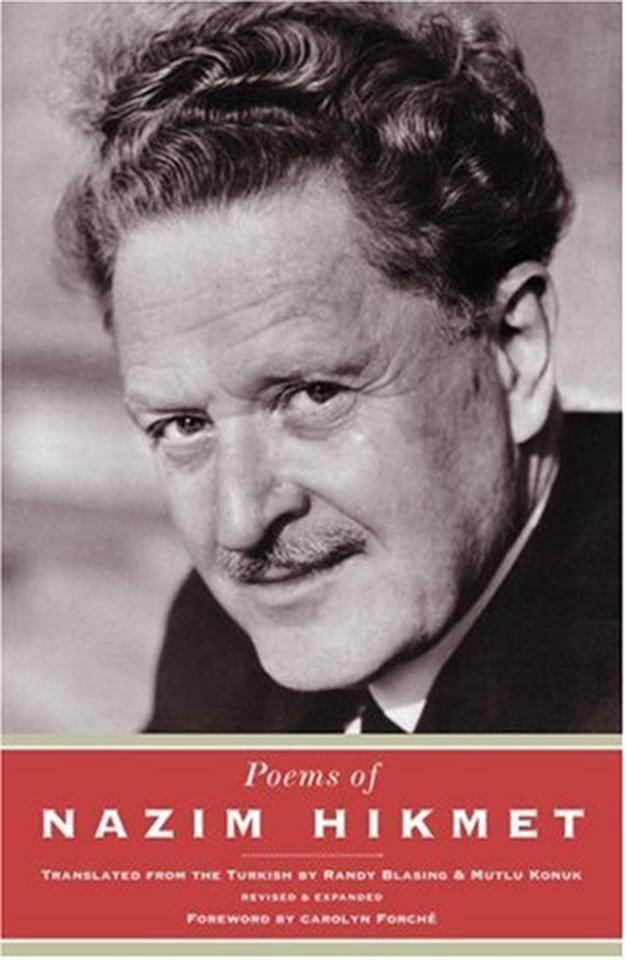The Poems of Nazım Hikmet
William Armstrong - william.armstrong@hdn.com.tr
 ‘Poems of Nazım Hikmet’ translated by Randy Blasing and Mutlu Konuk Blasing (Persea Books, 2002, 30TL, pp 288)
‘Poems of Nazım Hikmet’ translated by Randy Blasing and Mutlu Konuk Blasing (Persea Books, 2002, 30TL, pp 288)In a recently published biography, Nazım Hikmet is described as a “mythopoetic” figure, a “phantasmagoria” who comes to present-day readers “swathed in legends.” Such baggage probably explains the feeling of reticence I had whenever I approached his work – for a long time I was unable to move beyond that off-putting impression of the self-proclaimed “hero poet.” It was a heroism that always seemed too earnest, too unquestioning, and too compromised by his since-discredited communism. Having recently returned to Hikmet, I realize now that although this reading is true about some of his poems, it’s too simplistic to caricature his work as a whole in this way. At his best, he is a truly universal force, transcending narrow ideology and appealing directly to the human impulse.
Hikmet’s poetry can be roughly divided into three categories, reflecting the three distinct periods of his life. The first consists of his early, ideologically tub-thumping work, intended to be broadcast on a loudspeaker platform; the second comes during the time he was held in prison for 13 years – where he was forced to “address his multitudes” in a more personal, intimate voice; the third comes post-jail, written in exile from Turkey.
It was in the second of these periods that Hikmet reached the apogee of his poetic power. Sentenced by a military court in 1938 on charges of “inciting military cadets to revolt” (they were found reading his “Epic of Sheik Bedreddin”), he was forced to reconsider his poetic language in jail. The difficult truth to confront about prison’s effect on Hikmet’s poetry was later summed up by Pablo Neruda, who wrote: “Nazım’s lyrical work reached its greatest there. His voice became the voice of the world.” Whatever harm it did to his physical and mental health, prison consummated Hikmet’s poetry, forcing it to undergo a fundamental change in tone. Although still passionately engaged in the struggles of the “real world,” a personal, intimate, even vulnerable voice emerged. Inside, he finally realized the ambition he had earlier set out: “To write poems that speak only about me, addressing just one other person, and at the same time call out to millions”:
Part of you may live alone inside,
like a stone at the bottom of a well.
But the other part
must be so caught up
in the flurry of the world
that you shiver there inside
When outside, at forty days’ distance, a leaf moves.
Such poems open Hikmet up, and can be admired even by those who don’t care for or about his politics.
He was eventually released from prison in 1950, following a general amnesty that followed the Turkish Republic’s first open elections. However, life outside after 13 years was still fraught with complications, and he ended up leaving his family and returning to Moscow, from which he would travel tirelessly for the remaining 13 years of his life. But for all this manic travelling, Hikmet wasn’t free. What’s more, his romantic 1920s dreams of the sunny uplands of Soviet communism – effectively put in deep freeze throughout his time in jail - were finally confronted by the grim reality of 1950s Moscow, a police state far worse than anything imaginable in Istanbul. One does get the sense in much of his late exile poetry of a man struggling to maintain his innate optimism in the face of all evidence:
the train derails
the ship sinks
the plane crashes.
The map is drawn on ice.
But if I could
Begin this journey all over again,
I would.
Looked at from today, Hikmet’s struggles seem very much of their time, and there will probably always be a limit to present generations’ receptiveness to his work, particularly outside his native country. Still, read in Turkey at a time like now, his passionate determination to be free is very attractive.
Notable recent release
‘1913: The World before the Great War’ by Charles Emmerson
(Vintage, $30, pp 544)
William Armstrong,
 ‘Poems of Nazım Hikmet’ translated by Randy Blasing and Mutlu Konuk Blasing (Persea Books, 2002, 30TL, pp 288)
‘Poems of Nazım Hikmet’ translated by Randy Blasing and Mutlu Konuk Blasing (Persea Books, 2002, 30TL, pp 288)